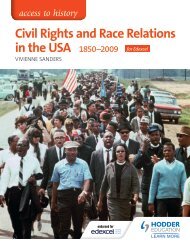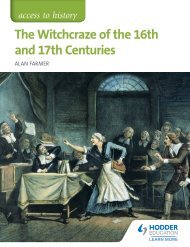SAMPLE
Sample-chapter-for%20Early-Elizabethan-England,-1558-1588,-Student-Book
Sample-chapter-for%20Early-Elizabethan-England,-1558-1588,-Student-Book
Create successful ePaper yourself
Turn your PDF publications into a flip-book with our unique Google optimized e-Paper software.
1.4 The problem of Mary, Queen of Scots<br />
1.4 The problem of Mary, Queen of Scots<br />
Relations between Elizabeth and Mary,<br />
1568–69<br />
What were Elizabeth’s options?<br />
Mary’s arrival in England in May 1568 was a problem<br />
to which there was no good solution. Elizabeth did<br />
not approve of subjects overthrowing their rightful<br />
monarchs, but she was very aware of the potential<br />
threat Mary posed to her throne. Mary was held in<br />
comfort, but under guard, until Elizabeth decided what<br />
to do with her. The options were:<br />
1 help Mary to regain her throne<br />
2 hand Mary over to the Scottish lords<br />
3 allow Mary to go abroad<br />
4 keep Mary in England.<br />
Activities<br />
1 Imagine you are Elizabeth I. List the pros and cons<br />
of the four options concerning what to do with<br />
Mary.<br />
2 If you were Elizabeth I, which option would you<br />
choose and why? Write a short letter to your<br />
Secretary of State, Sir William Cecil, explaining<br />
your decision. To do this you will need to explain<br />
why you rejected the other options.<br />
3 Split into two groups, with one group arguing for<br />
Mary being allowed to stay in England, and the<br />
other group against. Conduct a debate. Make sure<br />
you include all the information you listed in your<br />
pros and cons list.<br />
The two queens never met, although they did exchange<br />
letters. Mary had asked for a meeting with Elizabeth to<br />
persuade her of her innocence in Darnley’s murder, but<br />
her request was refused.<br />
A court was convened to hear the case against her<br />
between October 1568 and January 1569. The Scottish<br />
lords brought letters with them apparently proving<br />
Mary’s guilt. Mary said that the court had no right to try<br />
her because she was an anointed monarch and would<br />
not offer a plea unless Elizabeth guaranteed a verdict of<br />
innocent. Elizabeth refused.<br />
Guilty or not guilty?<br />
No verdict could solve the Mary, Queen of Scots,<br />
problem. If found guilty, she would be returned to the<br />
rebel Scottish lords as their prisoner, and Elizabeth<br />
would have been supporting the deposing of an<br />
anointed monarch, who was also her cousin. If found<br />
innocent, Mary would be free to raise an army, possibly<br />
with foreign Catholic support, which would pose too big<br />
a threat to Elizabeth’s throne.<br />
The court did not reach any conclusions. Mary therefore<br />
stayed in England, in captivity. She remained a threat to<br />
Elizabeth, as Interpretation 1 shows.<br />
Interpretation 1<br />
Historian Susan Brigden discusses the threat of Mary,<br />
Queen of Scots, in her book, New Worlds, Lost Worlds (2000).<br />
Whether in England or in Scotland or in France,<br />
Mary posed a perpetual menace, for she always<br />
pressed her claim to the English throne, and<br />
sought by any means to free herself from a<br />
protection which became captivity.<br />
Extend your knowledge<br />
Why not make Mary heir to the throne?<br />
It is often thought that Elizabeth’s attitude to Mary,<br />
Queen of Scots, and her refusal to name her as heir,<br />
is at least partly explained by jealousy. Mary was<br />
considered a great beauty.<br />
Draft material<br />
It is important to remember, however, that Elizabeth<br />
was a queen and an intelligent woman who<br />
understood politics very well. She was increasingly<br />
concerned about both the threat from foreign,<br />
Catholic powers and her own Catholic subjects.<br />
Naming a Catholic heir could make divisions in<br />
England worse, or encourage Catholics to put Mary<br />
on the throne instead. Many of her advisers and<br />
Privy Councillors were Protestants, and Mary was<br />
not popular with them. Naming her the heir to the<br />
English throne would increase her status and could<br />
damage Elizabeth’s position, too.<br />
THINKING<br />
HISTORICALLY<br />
Fragile history<br />
Nothing that happens is inevitable. Sometimes things happen due to the actions of an individual or chance events<br />
that no one anticipated. Something could have altered or someone could have chosen differently, bringing about<br />
a very different outcome. What actually occurred in the past did happen, but it did not have to be like that.<br />
Work on your own and answer the questions below. When you have answered the questions, discuss the answers<br />
in a group. Then have a class vote.<br />
Perceived reasons why Elizabeth I successfully established her Religious Settlement<br />
Elizabeth I’s<br />
middle way<br />
strategy,<br />
acceptable to<br />
both Catholics<br />
and Protestants<br />
Cause and Consequence (4a&b)<br />
Growth of<br />
Protestantism<br />
England<br />
Exam-style question, Section B<br />
Recusants<br />
were not<br />
treated<br />
harshly<br />
Explain why the Catholic threat to Elizabeth I<br />
increased after 1566.<br />
You may use the following in your answer:<br />
••<br />
The Dutch Revolt<br />
••<br />
Mary, Queen of Scots’ arrival in England in 1568<br />
You must also use information of your own. 12 marks<br />
Visitations<br />
to enforce<br />
Elizabeth’s<br />
religious<br />
settlement<br />
Exam tip<br />
The decision<br />
to keep<br />
Mary, Queen<br />
of Scots in<br />
captivity in<br />
England<br />
Catholic<br />
Spain and<br />
France did<br />
not unite<br />
against<br />
Protestant<br />
England<br />
Elizabeth I<br />
not getting<br />
directly<br />
involved in<br />
the Dutch<br />
Revolt<br />
1 Consider Elizabeth I’s middle way strategy.<br />
a How did not treating recusants harshly affect the success of Elizabeth I’s middle way strategy?<br />
b Had recusants been treated harshly, would the middle way strategy be relevant?<br />
2 Consider Elizabeth’s motivations.<br />
a What might have happened if Elizabeth I had decided to take military action to support the Dutch rebels?<br />
Would all the other causes still be relevant?<br />
b What might have happened if Spain and France had united against England?<br />
c How did keeping Mary, Queen of Scots in captivity in England affect the outcome?<br />
4 Write down any reasons why the Elizabethan Religious Settlement was successful that could be called ‘chance<br />
events.’ How important were these in the success of the Elizabethan Religious Settlement?<br />
5 Imagine you are alive in November 1558, when Elizabeth I became Protestant queen of a country that was still<br />
basically Roman Catholic. Write a paragraph explaining whether you think Elizabeth I will be able to establish<br />
her religion in England over the next 11 years. Remember not to use the benefit of hindsight!<br />
6 Have a class vote. Was the success of Elizabeth I’s religious settlement inevitable? Be prepared to back up your<br />
decision.<br />
Draft material<br />
Don’t just describe events. You must focus on reasons<br />
for the Catholic threat against Elizabeth becoming<br />
more serious.<br />
34<br />
35




